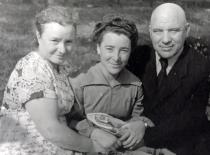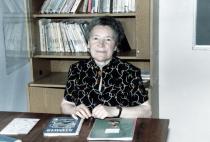From left to right: I, Communella Bunikovskaya, my mother Gita Bunikovskaya and my sister Inessa Bunikovskaya photographed to send the photo to my father at the front. Bolgrad, Izmail region, 1944.
In summer 1935 we moved to Makeevka, a small town of miners near Stalino. My father got a job there. We lived in a 3-room apartment on the 2nd floor of a 4-storied building in the center of Makeevka. I remember bookshelves by two walls in our living room: classic books and dictionaries. Besides Russian classic there were books by Sholem Alechem and other Jewish authors in Russian. My mother and father communicated in Yiddish, but my father forbade my mother to teach my sister and me Yiddish. He believed that this language would die out and Jews would get assimilated. We didn't observe any Jewish traditions in our family. This was the period of struggle against religion and I don't remember any other Jewish families observing traditions at that time.
I went to school in 1937. I studied in a Russian school. I don't know whether there were Jewish schools in Makeevka, but our father wouldn't let us go to a Jewish school anyway. I did very well at school. There was no anti-Semitism at school before the war.
In September 1941 we evacuated with the plant where our father worked to Barnaul Altaysk region [over 4 thousand km from Kiev]. We didn't take any warm clothes since we believed that we would come back home in a short time. There was a big carpet in our living room where my parents stored photographs, documents and some other papers and just few items of clothing. We traveled in a freight railcar in for about 3 weeks. We passed by a bombed train - I remember the frightening sight of wounded and dead people. We had a one-liter packet of caviar with us and this was all we ate on the road - there wasn't even bread; since then I hate red caviar.
It was freezing in Barnaul when we arrived. Some people that came in evacuation had their ears or noses frost bitten on the first days. Few plants evacuated to Barnaul were installed together to form one bigger plant of tank engines. My parents worked at this plant. During the war my father became a member of the Communist Party. At the beginning of 1942 our father volunteered to the front. Our mother was assistant human resources manager at the founding shop. We stayed in a room with a stove in a wooden barrack in the outskirts of the town. This stove didn't provide sufficient heating - in the morning our hair was iced to the wall so cold it was. We lived on the second floor and our window faced a work farm. In the morning trucks brought dead bodies of inmates to dump them in a pit and we could hear the sound of dead bodies hitting the frozen ground. Evacuated families received small plots of land from the plant. We grew potatoes, sunflowers, pumpkins and beans on our plot of land in the vicinity of the town. Our mother came from work late and my sister and I got starved waiting for her to bring some food. She usually brought frozen potatoes, but sometimes she got sugar beetroots. We used to bake slices of beets and pumpkin - they were delicious. My mother used to call it a 'dinner of a tsar'. My mother managed to write poems and arrange a literary club at the plant. She wrote mainly about patriotism of the Soviet people, hard work in the rear and about husbands and sons struggling for freedom of their Motherland.
In autumn 1944 my mother got a job invitation from 'Pridunayskaya Pravda', a regional newspaper in Izmail in the south of Ukraine in 600 km from Kiev. We went there. My father was a military correspondent. He got an opportunity to come and see us and rented a room in a private house (of a Bulgarian family) in Bolgrad [40 km from Izmail]. My mother was an editor in Pridunayskaya Pravda [a small weekly communist newspaper]. Inna and I went to a Russian school This area was populated with Moldavians, Bulgarians, Rumanians, Russians and Ukrainians, but there was no anti-Semitism and children played and studied together.
On 9 May 1945, Victory Day, we were in Bolgrad. This was the happiest spring in my life. After the war was over my father demobilized and got a job of director of the town library in Izmail. We moved there to join him. I became a Komsomol member in Izmail. Inna and I studied in a secondary and music school. Our mother was an editor in the 'Pridunayskaya Pravda' newspaper - she also headed a literary club there. My father was free-lance lecturer of the Republican Bureau of lecturers. In 1947 he got a job offer in Kiev and we moved again. We rented an apartment there.
Communella Bunikovskaya with her mother Gita Bunikovskaya and sister Inessa Goldshtein
The Centropa Collection at USHMM
The Centropa archive has been acquired by the United States Holocaust Memorial Museum in Washington, DC.
USHMM will soon offer a Special Collections page for Centropa.
Academics please note: USHMM can provide you with original language word-for-word transcripts and high resolution photographs. All publications should be credited: "From the Centropa Collection at the United States Memorial Museum in Washington, DC". Please contact collection [at] centropa.org.

















